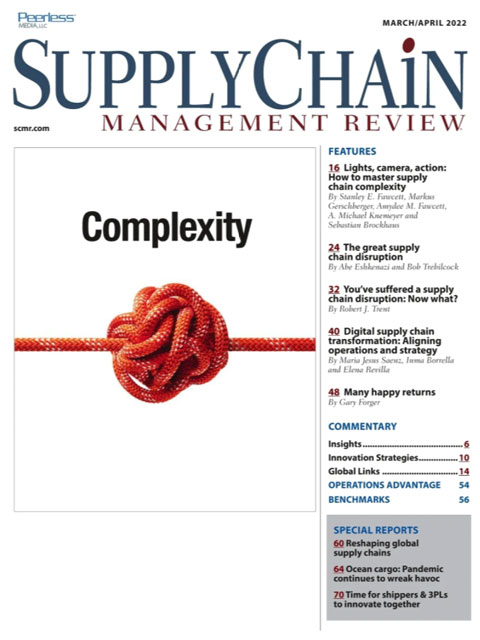Sorry, but your login has failed. Please recheck your login information and resubmit. If your subscription has expired, renew here.
March-April 2022
Yesterday, I hosted a webinar on the steps supply chain leaders are taking to redesign their supply chains to cope with this period of unprecedented demand. Earlier last month, I attended the Manifest conference in Las Vegas. The exhibitors featured a lineup of supply chain startups while the attendee list was dominated by venture capital firms looking to get in on the action in our booming industry. This morning, one of the lead news stories is about another disruption threatening to bring global supply chains to a halt: Browse this issue archive.Need Help? Contact customer service 847-559-7581 More options
Cryptocurrency is crossing the chasm to the mainstream. For evidence, look no further than the Crypto.com Arena, the new name of the Staple Center, with naming rights clocking in at a mere $700 million (dry humor intended). From the entry of Bitcoin as a dark web currency for conducting illicit activities, we have witnessed the explosive growth of Cryptocurrency through its ability to service legal, financial and business operations. What will its impact be on supply chain and why does it matter? Is the early hype living up to expectations? It’s our intent to provide a few use cases that supply chain leaders can use to capitalize on Cryptocurrency for supply chain finance operations. We’ll start with a primer to understand how blockchain, another hyped technology, supports Cryptocurrency commerce.
Blockchain enables Cryptocurrencies for commerce
While our focus is to explore Cryptocurrency for supply chain finance, it’s critical to understand how the underlying blockchain plays a role in enabling Cryptocurrency commerce. A blockchain is a digital network deployed globally with a multitude of nodes, not unlike a supply network ecosystem. These nodes process transactions through a variety of mechanisms and after completion, the transaction will be listed on the blockchain.
Transactions cannot be altered (a property defined as immutability). Much of the benefit derived from blockchain is that it enables organizations to execute business transactions. Blockchain is used as the arbiter to determine if the conditions of the transaction have been successfully fulfilled upon completion of given conditions. This is a property known as disintermediation and will be explored further in the topic describing use cases.
Mainstream blockchain technologies
For the purposes of this discussion, let’s review two blockchain technologies: Bitcoin and Ethereum. People are likely familiar with Bitcoin and Ethereum but there are many others that can deliver the value organizations are seeking. The Bitcoin network was the first blockchain network and has the largest market cap at an estimate $1.09 trillion. Unfortunately, Bitcoin has limited capabilities to support the applications and use cases to support supply chain requirements; but upgrades are in the works that may support these in the future.

This complete article is available to subscribers only.
Log in now for full access or start your PLUS+ subscription for instant access.
SC
MR
Sorry, but your login has failed. Please recheck your login information and resubmit. If your subscription has expired, renew here.
March-April 2022
Yesterday, I hosted a webinar on the steps supply chain leaders are taking to redesign their supply chains to cope with this period of unprecedented demand. Earlier last month, I attended the Manifest conference in… Browse this issue archive. Access your online digital edition. Download a PDF file of the March-April 2022 issue.Cryptocurrency is crossing the chasm to the mainstream. For evidence, look no further than the Crypto.com Arena, the new name of the Staple Center, with naming rights clocking in at a mere $700 million (dry humor intended). From the entry of Bitcoin as a dark web currency for conducting illicit activities, we have witnessed the explosive growth of Cryptocurrency through its ability to service legal, financial and business operations. What will its impact be on supply chain and why does it matter? Is the early hype living up to expectations? It’s our intent to provide a few use cases that supply chain leaders can use to capitalize on Cryptocurrency for supply chain finance operations. We’ll start with a primer to understand how blockchain, another hyped technology, supports Cryptocurrency commerce.
Blockchain enables Cryptocurrencies for commerce
While our focus is to explore Cryptocurrency for supply chain finance, it’s critical to understand how the underlying blockchain plays a role in enabling Cryptocurrency commerce. A blockchain is a digital network deployed globally with a multitude of nodes, not unlike a supply network ecosystem. These nodes process transactions through a variety of mechanisms and after completion, the transaction will be listed on the blockchain.
Transactions cannot be altered (a property defined as immutability). Much of the benefit derived from blockchain is that it enables organizations to execute business transactions. Blockchain is used as the arbiter to determine if the conditions of the transaction have been successfully fulfilled upon completion of given conditions. This is a property known as disintermediation and will be explored further in the topic describing use cases.
Mainstream blockchain technologies
For the purposes of this discussion, let’s review two blockchain technologies: Bitcoin and Ethereum. People are likely familiar with Bitcoin and Ethereum but there are many others that can deliver the value organizations are seeking. The Bitcoin network was the first blockchain network and has the largest market cap at an estimate $1.09 trillion. Unfortunately, Bitcoin has limited capabilities to support the applications and use cases to support supply chain requirements; but upgrades are in the works that may support these in the future.
SC
MR


More Finance
- Investor expectations influencing supply chain decision-making
- ISM reports manufacturing sees growth in March, snaps 16-month stretch of contraction
- Supply Chains Facing New Pressures as Companies Seek Cost Savings
- February retail sales see annual and sequential gains, reports Commerce and NRF
- A New Model for Retailer-Supplier Collaboration
- How to Create Real Retailer-Brand Loyalty
- More Finance
Latest Podcast

 Explore
Explore
Topics
Business Management News
- April manufacturing output slides after growing in March
- Q1 sees a solid finish with positive U.S.-bound import growth, notes S&P Global Market Intelligence
- 6 Questions With … Sandeep Bhide
- MIT CTL offering humanitarian logistics course
- Bridging the ESG gap in supply chain management: From ambition to action
- Few executives believe their supply chains can respond quickly to disruptions
- More Business Management
Latest Business Management Resources

Subscribe

Supply Chain Management Review delivers the best industry content.

Editors’ Picks






